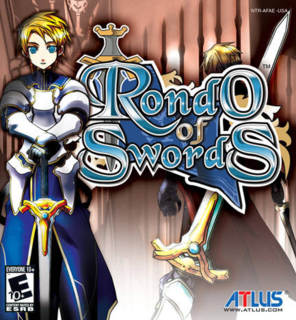A few snags hinder this otherwise interesting addition to the genre.
I really, really don't like rating these types of games with a numerical score. If my opinion meant anything to the gaming community, I probably wouldn't even do it, and here's why: I am very grateful to Atlus. If it weren't for them, I wouldn't have played half of the games that have shaped my view on gaming in general. So, let me address them before I begin: I don't want you to stop. I don't even want you to be more selective. If there's a game that bears your logo, I will play it.
On to Rondo of Swords. The first thing that bothered me about this game was the opening sequence. It felt abrupt, like a train hitting a bicycle. You're given about a dozen lines of text that mentions a lot of names, summarizes some history that sounds important and makes you wonder if you missed the first installment in the series, then, BAM! I will say that this game has nothing of Final Fantasy's cinematic subtlety, but that isn't necessarily to the game's discredit.
Like other games in this genre, a character's usefulness is determined by their stats. While movement has always played an important role in combat, it is something of a cornerstone in this game. Instead of moving adjacent to enemies to attack, as is standard fare, you run through them, potentially damaging every enemy in your path. It's an interesting system that I honestly enjoyed for the most part, and while it makes some simple strategies more difficult to pull off, a clever and cunning mind can adapt.
The game takes an annoying turn, unfortunately, when you throw in random counter-attacks. Depending on where you attack an enemy from (front, side, or rear) that enemy has a hidden percentile chance to counter-attack, which abruptly stops your charge and leaves you open to a devastating attack on your enemy's next turn. This is a problem because cunning strategies that you've carefully laid out can often fall apart in these situations and leave you to the mercy of your enemies, who can dominate your force in a single turn, if you allow them the opportunity. I liken it to chess: say your knight was trying to attack my bishop. Instead of allowing you to take my piece, I flip a coin and force you to sit on the square adjacent to that piece, leaving you open to an attack that nullifies your entire strategy. It's one thing to adapt to an enemy that moves in curious ways, but it isn't fun to have to factor in random chance to your planning, and the game wasn't built for it. It also isn't fun to see a puny bandit stop my horseman's charge by hitting the horse with a shield.
Another problem I have with the game comes in the form of the skill system. There are various skills that allow your character to raise his attack at the cost of defense, or lessen defense against specific types of defense during the enemy's next turn. The problem is that, because you attack by moving, your "movement" and "action" phase are essentially one in the same. That said, you can't move into an archer's line of sight and then activate your skill that lessens arrow damage, and many times you need to be in range of a particular enemy to provoke them out of a standstill. It's a design flaw that essentially makes most of the game's skills useless.
As your roster of characters grows, you run into another problem: only six characters can march out onto the field in any given battle. Fortunately, the characters you don't take can embark on a number of quests and other, less epic tasks (like grocery shopping) while you're off punishing evil. After having recently completed Fire Emblem: Radiant Dawn, this was a pleasant addition that should be included in every game of its kind in one way or another.
After battles, you receive gold and items. There's a catch, though: you're ranked on your performance. There are three ranks: overwhelming victory, victory, and narrow victory. The items you receive differ depending on which ranking you earn, but the whole system seems a bit imbalanced. I've completed levels without taking a single point of damage and still earned a "narrow victory."
If you're playing this game for the story, you're in for a standard adventure with a few twists. Your characters banter amongst themselves depending on their relationships to one another and are generally likable, and the secret behind Prince Serdic, the hero, makes for some truly interesting dialogue. I wouldn't buy this one without playing it, but I would definitely recommend trying it via rental.

